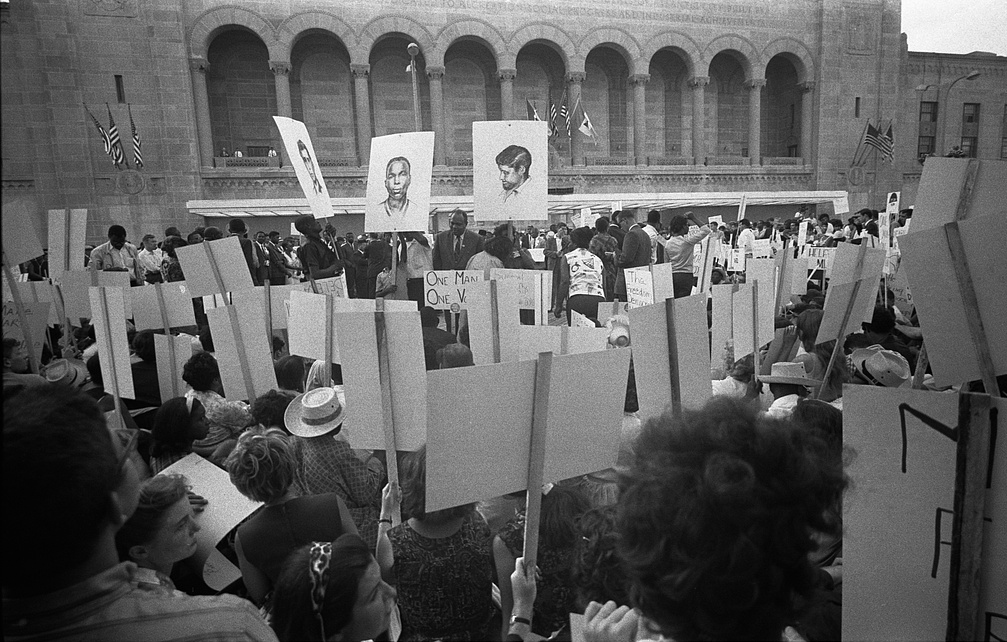Freedom Summer was a civil rights campaign launched in the United States in the summer of 1964 to help African Americans in Mississippi register to vote. At that time, many Southern States used various methods to deprive Black citizens of their voting rights. Hundreds of volunteers and civil rights workers from across the United States, including many white college students from the North, traveled to Mississippi to join local Black volunteers on the campaign. Three of the workers were murdered by the Ku Klux Klan near Philadelphia, Mississippi. The Ku Klux Klan is a group of white secret societies whose members oppose the advancement of Black people, Jews, and other minority groups. The case became known as the “Freedom Summer” murder case or the “Mississippi Burning” murder case. It was notable as the first successful federal prosecution of a civil rights case in Mississippi. Outrage over the case helped gain passage of the Voting Rights Act of 1965.

The Freedom Summer campaign was part of a larger effort by the civil rights groups the Congress of Racial Equality (CORE) and the Student Nonviolent Coordinating Committee (SNCC) to expand Black voting in the South. In Mississippi, the project was run by the local Council of Federated Organizations (COFO), an association of civil rights groups in which SNCC was the most active member. The campaign was originally called the Mississippi Summer Project. Mississippi was chosen as the site of the project because of its historically low levels of African American voter registration.
In October and November 1963, about 100 white college students had helped SNCC register Black voters for a mock (symbolic) gubernatorial election in Mississippi. Several hundred more students were invited to the state in 1964 for an expanded project, which later became known as Freedom Summer. In addition to registering Black voters, the project worked to establish “Freedom Schools” and African American community centers. Freedom Schools were free, temporary, alternative schools for African Americans. The schools offered academic courses and worked to foster political participation among African American elementary and high school students. The Freedom Summer project also helped establish the Mississippi Freedom Democratic Party (MFDP) as a racially integrated alternative to the all-white Democratic Party of Mississippi. The MFDP tried but failed to get its slate of delegates seated at the 1964 Democratic National Convention. See Hamer, Fannie Lou.
Many Freedom Summer volunteers and workers faced abuse and harassment from white residents. In addition, the Ku Klux Klan, local police, and jailers often carried out violent attacks against them. In June, Andrew Goodman, a white volunteer, and Michael Schwerner, a white civil rights worker, both from New York City; and James Chaney, a Black civil rights worker from Meridian, Mississippi; were working together in Meridian as part of the campaign. On June 21, the three men were on their way back from investigating the burning of an African American church in Neshoba County when they were taken into custody for speeding by a deputy sheriff. After the men were released from county jail in Philadelphia, a Ku Klux Klan mob followed their car, forced it off the road, and shot the men to death. The workers’ station wagon was found two days later. Initially classified as a missing persons case, the men’s disappearance sparked national outrage and a kidnapping investigation led by the Federal Bureau of Investigation (FBI). The FBI found the bodies of the three men 44 days after their disappearance, buried in an earthen dam.
In 1967, 18 men were tried on federal civil rights charges in the case. An all-white jury convicted seven of them of violating the civil rights of the three Freedom Summer workers. At the time, no federal murder statutes existed, and the state never brought murder charges. None of the convicted men served more than six years in prison. The plot leader, Edgar Ray Killen, a Baptist minister, avoided a conviction because of a hung jury. A hung jury is one that cannot agree on a verdict in a case. Killen was finally convicted in a 2005 trial based on new evidence unveiled in 1998. He was convicted of manslaughter and sentenced to 60 years in prison. (Killen died in prison in 2018.) In 2010, federal authorities reopened the investigation, looking for evidence with which to prosecute the remaining suspects. However, that investigation came to a halt after the Mississippi attorney general determined that further prosecutions were impossible. In 2014, President Barack Obama posthumously awarded Chaney, Goodman, and Schwerner the Presidential Medal of Freedom. The murder case was closed in 2016.
